In this article, you’ll learn how to:
- Supercharge your learning speed whether beginner, intermediate, or advanced.
- Feel MUCH more comfortable speaking the language even if you only know a few words
- Avoid getting stuck or frustrated and quitting
- Maximize your learning time so you can still make progress even if you’re busy with a full-time job, a family, etc.
- Do all the above in a way that pulls you forward rather than forcing yourself to study (which never works)

I failed language classes when I was a kid and always thought I just “wasn’t good with languages.”
Yet I was able to use these tips to learn French and Chinese — two VERY different languages — quickly, correctly, and effectively.
I even did it while freelancing full-time! (So you don’t need to be a guru who spends their life learning languages). Here’s how:
1. Use the “Bruce Lee Hack” to speak better RIGHT NOW
Language experts always want you to have conversations with people.
But what if you can’t speak well? What if you only know a few words and can’t speak at all?
Then treat your words like Bruce Lee treats his kicks.
I fear not the man who has practiced 10,000 kicks once, but I fear the man who has practiced one kick 10,000 times.
bruce lee

Whether you know as many as 1,000 words or as few as just ONE word, it’s a stunningly simple way to start speaking better today.
For example:
Let’s say you’re interested in French but know absolutely NOTHING except for “bonjour.”
Own it! Master it! Make it the best damn “bonjour” you can possibly say. Make the accent sound AMAZING. Make it sound smooth when you say it.
If you know a couple of sentences and phrases, do the same thing. Take ownership of those words. Practice them. You can always switch back to English when you run out.
As you do this, you’ll be able to relax, let your words come out naturally, and sound so much better. (And you won’t speak… like… this… because… you’re… thinking… so… much.)
Here’s how I used it last year when I was in Poland and arrived not knowing a single word: I committed myself to learning basic greetings (“hello, thank you, etc.”).
One day, I went to a coffee shop I visited a few times before and said hello, which is “Dzień dobry!”
The staff (who knew me) were so busy that, without looking, they just replied. When they finally turned around, they jumped up and said, “Oh, it’s you! We thought you were Polish! You said it so well!”
That’s because I said it dozens of times every day I was there!
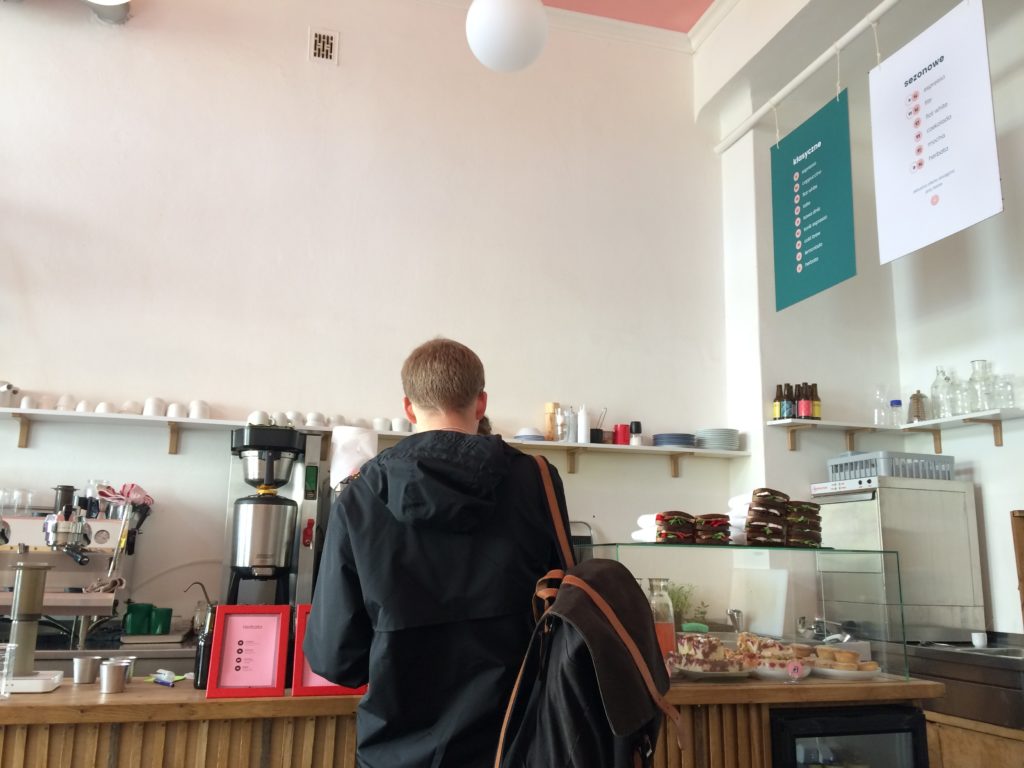
(Even if you aren’t committed to learn a foreign language yet, start with this little hack and see if it changes how you feel.)
It takes no additional knowledge. It’s just maximizing what you ALREADY have. Using the Bruce Lee hack, you’ll talk more skillfully without learning anything different.
You’ll be able to trust yourself and that’s how you sound amazing.
2. Talk to your FUTURE self (no time machine needed)
When you study a foreign language, you’ll regularly learn something new.
So, in a sense, you’ll regularly feel… like an idiot.
It’s like running a race where they constantly pull the finish line further back — even though you already ran a marathon, the finish line will seem out of reach.

The problem is, if you continually feel like you’re falling short, you can hurt your confidence, motivation, and persistence, especially when things get hard.
That’s when you end up with language apps, books, etc. that you haven’t touched in YEARS.
But the trick to confidence isn’t to look forward toward your goals; the trick is to periodically look backwards at the starting point. (After all, it’s hard to gauge our own progress when we hear ourselves daily.)
Try these tactics to get a mental and emotional boost:
- Once every two weeks, write letter to yourself in a foreign language about what you did that week and try to use everything that you know. It doesn’t have to be long, but try to flex your muscles. Then read it again in two weeks.
- You can use FutureMe to email a letter to yourself at a specific time in the future.
- If you only know a couple of words, feel free to write 95% in English and sub in the few words you do know. Or if that’s too hard, just write down all the vocabulary you know in a list even if it’s as basic as “hello, dog, cat, thanks, etc.” (It’s even more striking to see your achievements!)
- If you feel comfortable, you can also record a video of yourself speaking for two or three minutes using the same concept.
Then, every two weeks, review the previous video, letter, etc. and see how far you’ve come. Prove to yourself how much you have learned and accomplished.


My friend sent me the screenshot above from when he sent a letter to his future self. He was quick to point out he didn’t even get those 3 words right (it’s “parles,” not “parle“), but was proud he could fix it now!
This gives you REAL confidence. That way, even if you’re having tough moments with the language, you’ll see that you are achieving and are growing.
This lesson comes from the founder of Strategic Coach, Dan Sullivan, who has over 40 years of experience as a strategic planner and coach to thousands of entrepreneurs worldwide and has over 30 publications. He teaches that you should measure the “gain,” not the “gap.”

The way to measure your progress is backward against where you started, not against your ideal.”
dan sullivan
The “gain” refers to how far you’ve come from when you started.
The “gap” is the opposite: how far you have to go to where you want to be.
One of my biggest mistakes — and the biggest mistakes I see from other learners — is focusing on the gap and how far they have to go before they’re “fluent.”
But focusing on the gap is a sure fire way to hurt motivation and confidence because you’re constantly thinking of your lack and failings.
Instead, regularly send messages to your future self and remind yourself of your “gain.” I promise you’ll feel way more confidence, pride, accomplishment, and motivation!
3. Immerse yourself in the culture — without leaving your home!
Everyone agrees the best way to learn a language fast is to immerse yourself.
But you don’t have to sell everything and move to a foreign country.
Instead, find ways to change up the environment you have right in front of you to dive headfirst — here are some ideas:
1) Buy a stack of sticky notes and put them all around your home, labeling household items in your target language so you’re constantly thinking about it.
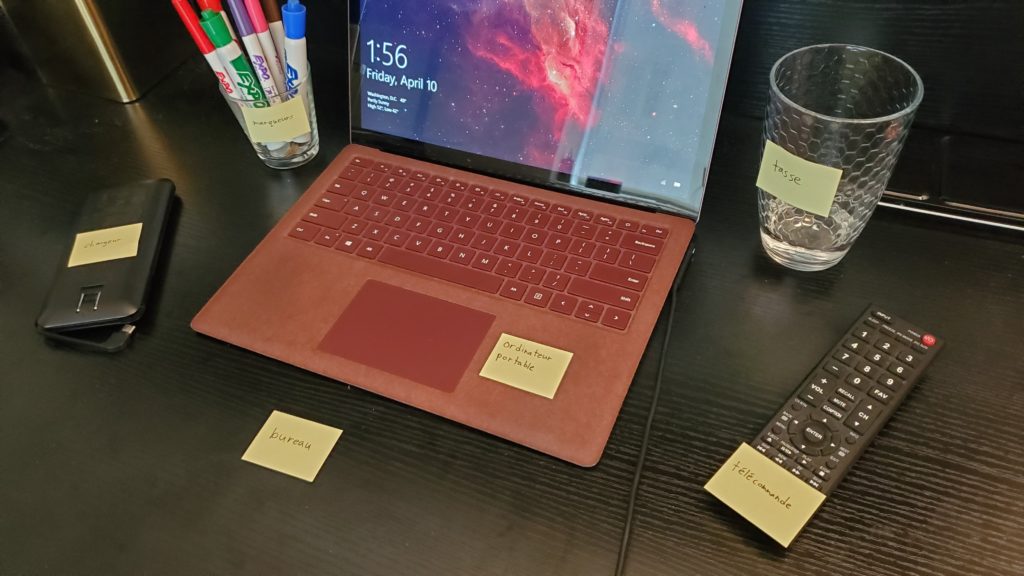
If there’s a certain phrase that you really want to memorize, write it down on a note and put it on your bathroom mirror.
2) Go to an international supermarket and buy foods, candies, snacks, sauces, etc. from that country.
Not only do you get to learn about the culture and the language from the food itself, but you’re also behaving in new ways, which will change your identity through what’s called “self signaling.”
3) If you like to cook, try cooking a tasty dish from that nation. Try a bomb Spanish paella, Korean tofu soup (love!), Russian stroganoff, Swedish meatballs… use your imagination. Try peeking at the recipe in the native language and learn as you go.
It might be the best damn (and best tasting) lesson you’ll ever do.

4) For intermediate and advanced: Switch your phone settings to your target language. I’ve seen people do this and I was impressed with how much they picked up by necessity. (If it’s too hard, switch one app and try it out.)
Whatever you choose, have fun with it! Within a few days, you’ll be surprised with how much you remember.
Some people, however, say you should listen to the language all the time — put it on in the background with radio, podcasts, videos, etc.
Honestly, I didn’t like it because it was just unintelligible. I think it’s better to take something you already do every day and bring the culture in.
This is how you build an environment that pulls you forward toward learning.
4. Hack your MINDSET about the language
Ever had a moment when you thought, “Argh! Why is this language so hard?!”
We all have.
But these seemingly innocuous thoughts can actually be extremely dangerous for language learning.
You’re basically traumatizing yourself and getting stuck. Psychologically, you’re actually making it harder to learn and you’re reinforcing and empowering the challenges and difficulties you’re facing.

You make the problem bigger than you are and make it harder to face it again.
Instead, don’t fight the language. If something is really complex and difficult, avoid feeling negative about it or empowering the difficult.
Instead, shift your mentality about the language by taking a deep breath, exhaling, and saying out loud:
If other people have learned [this language], so can I.
Remind yourself that you’re not alone. There are plenty of other people out there trying to learn the language too and, if millions of people out there can speak it, you can do it too.
Be the person who, when facing a challenge, can’t wait to jump right into it.
Here’s another tip: Focus on the part about the language that’s the easiest.
Every language has its trade-offs.
For example, French can be complex and difficult. But as an English speaker, there are a lot of similarities. Many verbs, nouns, and adjectives are the same, just with a French accent, and I had times where I just guessed the word and was right.
But let’s use a tougher example:
Chinese is ranked as one of the hardest languages in the world. Yes, the writing and reading and pronunciation can be tricky, but guess what?
The vocabulary is actually very basic compared to French or even English (there’s no gender specific nouns, etc.).
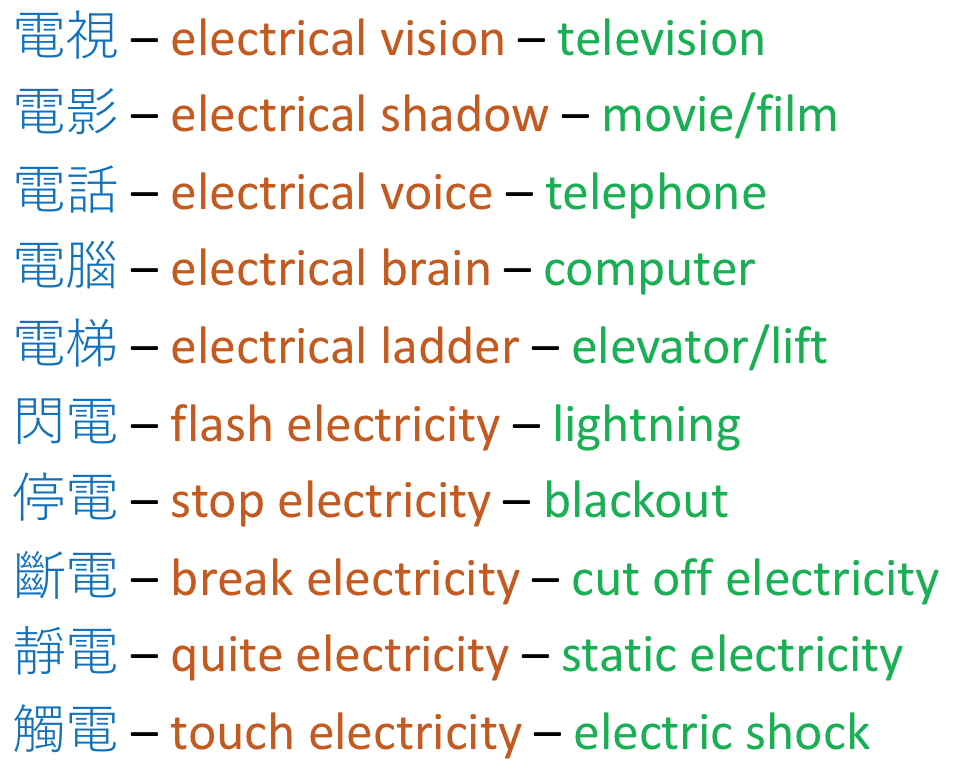
The grammar is also easier (there’s zero conjugation or irregular verbs) and the amount of words you need to know before you can become conversationally fluent is actually less than French, believe it or not!
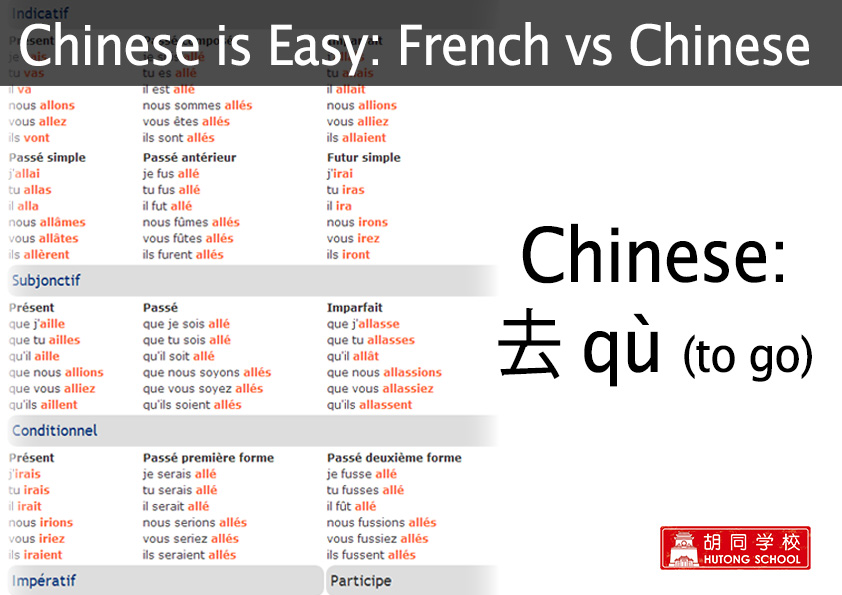
Focus on this.
Remind yourself about the things with your foreign language that make it EASY — the more you think about why the language is easier, the easier it gets to you.
5. Stop reading the news (and what to do instead)
People often say to “read the news” in a foreign language to get more practice.
But I actually don’t think it’s a great way to improve reading comprehension:
- You have to learn new words and vocabulary that aren’t really applicable to daily life.
- Unless you really like the news, you won’t be motivated to read it all the time
- If you do talk to locals, you don’t really want to talk like a news reporter
- And there is another way that’s a lot easier… (read on)
Truth be told, I don’t even like watching the news in English, let alone another language. But what do I like?
Sports. (Fortunately, so does the rest of France.)
Every day, I would read the sports news aloud. It was also helpful to see the English-speaking athletes have their statements translated into French.

Here’s the thing: It’s the exact same grammar. It’s the exact same language. There’s nothing incorrect about it. But it’s way more fun!
Think about it: You’ve learned a ton of vocabulary IN ENGLISH just from your own hobbies — all the vocabulary, terms, phrases, brands, acronyms, etc. It’s like it’s own language! And it didn’t even feel like “studying” because you loved it.
For example, I’ve never watched Game of Thrones, but hearing people talk about it is like hearing a different language. Heck, just take any work of fantasy and think of all the fake words you easily learned and remembered.
You can channel that power to learn ANY foreign language.
If you like fashion, try to find fashion bloggers in your target language. If you like video games, find gaming blogs in that language.
Even if you don’t know a single word, because it’s something you’re passionate and interested about, it’ll be so much easier for you to learn new vocabulary, persist when it’s difficult, and immerse yourself — which speeds up your learning.
But compare that to reading a news article about a tax bill… in a different country. (I’m going to go out on a limb and say your motivation won’t be as high.)
If you’re ready, you can also watch YouTube videos from native speakers about your hobbies and interests. That way, you can hear what they sound like in a native accent and speed. You get to hear the subtleties to really take your language to the next level.

(Read the comments too because you’ll see how people talk with each other informally and pick up things you’ll never get on a language app.)
6. Go to warp speed (this tip only works if you’re willing to be wrong)
Whether you’re using a language app, book, online course, flashcards, language exchange, or even taking a class in a real school, this tip will help maximize the knowledge you already have and train your ability to think faster.
But it only works if you give yourself permission to be wrong.
Sounds weird, right? Don’t you want to be RIGHT? (This goes against what you learned in school, being graded on accuracy, not demonstration of knowledge.)
The key to learn a language is to constantly break out of your comfort zone and use language for its true goal: Communication.
Communication is using the language to express ideas and feelings in real-time. So it helps to practice that urgency so you can communicate in real speeds.
Here’s the tip:
Once a week, try to take a quiz, exam, etc. as fast as you can (while still trying to be correct). It should feel like you’re going “warp speed;” like you don’t have enough time to think.

- If you’re doing a progress check in a language app, occasionally do it as fast as possible.
- If there’s a quiz in your study book, do half of it in a normal speed, and do the other half in “warp speed.”
- If you’re doing a language exchange or talking to a teacher, try to talk as fast as you can.
- If you’re writing or texting, try to do it in 50% less time than normal
It’s going to feel weird at first, but the more you do it, the better you’ll get and you’ll start sounding better and more natural!
This tip is about taking what you already have and putting it under higher and higher stress. That’s how you force yourself to give 110% and make big leaps.
Imagine learning how to hit a baseball. First, you start with the ball on a tee to learn the swing with a stationary ball. Then, you start at the slowest speed possible in the batting cages and slowly increase the speed.
What I’m saying is to regularly try a much faster speed and get accustomed to what it might be in a REAL-LIFE situation.

Take your time to learn a skill — vocabulary, sentences, grammar, etc. — but once you tried it a few times, do it faster and faster.
For this tip, it’s OK to be wrong; just make sure you’re doing it fast.
Note: If you don’t give yourself permission to be wrong, you won’t push yourself as hard as you can, you won’t take as many learning risks as you can, and you’ll try to keep your progress very slow and safe — and not progress as fast as possible.
(That’s why it’s so important to “measure the gain” because THAT’S what gives you confidence, even while you’re making mistakes.)
7. Level up and reap the rewards
All languages have some sort of standard progression on “moving up.”
For example, in French, there are levels of A1, A2, B1, B2, C1, C2. Each level has a certain amount of “estimated hours” it takes to move from one to another.

Traditionally, you slowly make incremental gains by following the prescribed path — books, apps, classes, etc. — day after day, week after week, month after month.
But the problem with this approach is you’re only going to learn language slowly. You’re following everyone else’s speed, not the speed that’s designed to give you lightning fast improvements. With the traditional path, the only way to go faster is to spend more time.
But to learn a foreign language super fast, do something counterintuitive:
Level up before you’re ready.
Regularly push your boundaries and challenge yourself. Try moving up one level higher than you think you’re at currently.
Rather than waiting until you’re “ready,” put yourself in a higher level and adapt to it. Repeat the process and you’ll progress WAY faster than if you waited until you “felt” ready.
Take an online exam that’s at a level a little higher. Skip ahead in your study book. In a language app, occasionally try to jump levels. Try to “skip grades.”

If you use it right, you can learn languages (and anything else, really) a heck of a lot faster than you ever did before.
I know people who speak well, but are afraid of skipping to a higher level, class, course, etc. because they don’t want it to “be too hard.” But by not challenging themselves, they won’t learn at the speed they’re capable of.
Oh, and you can always come back down if it really is “too hard.”
Often, “too hard” is in your head. The truth is we aren’t great at assessing how hard something really is. We tend to think we’ve hit our limits when we’ve only scratched the surface.
This comes from the Navy SEALs “40% rule:”
When your mind is telling you that you’ve reached your maximum, you’re only actually only 40% done.
You might worry, if you’re not ready and you jump a level, you won’t know a lot of things. That’s true. But now, you’ll go and learn them immediately rather than following the traditional path and waiting for the prescribed time to learn it.
Force your own hand.
[Here’s the secret: It’s going to feel just as difficult anyway. So you might as well shorten the distance it takes for you to get where you want to be.]
8. Once you’re able to, start speaking to the RIGHT people
The cliché is, if you want to learn a language FAST, date a native speaker. (I can tell you from first-hand experience, yes, this is true. But it’s not an obligation!)
It’s always ideal to speak with natives.
By doing this, you can improve MUCH FASTER because you have to use all your skills to hang with a native-speaker AND you’ll learn things you can’t get anywhere else.

Even when I only knew a handful of sentences and phrases, I forced myself to talk to native speakers. Eek! It was awkward. There were pauses. I had to make lots of body gestures. There were moments I had no idea what to say.
But I kept reminding to myself that I was learning in those moments.
Here are some language sites where you can speak with natives:
- Italki (I used this site and enjoyed it)
- Preply
- Verbling
- My Language Exchange (I used this site over 10 years ago to learn Chinese… and it still looks the exact same)
- Conversation Exchange
- Meetup (you can join a language meetup in your city)
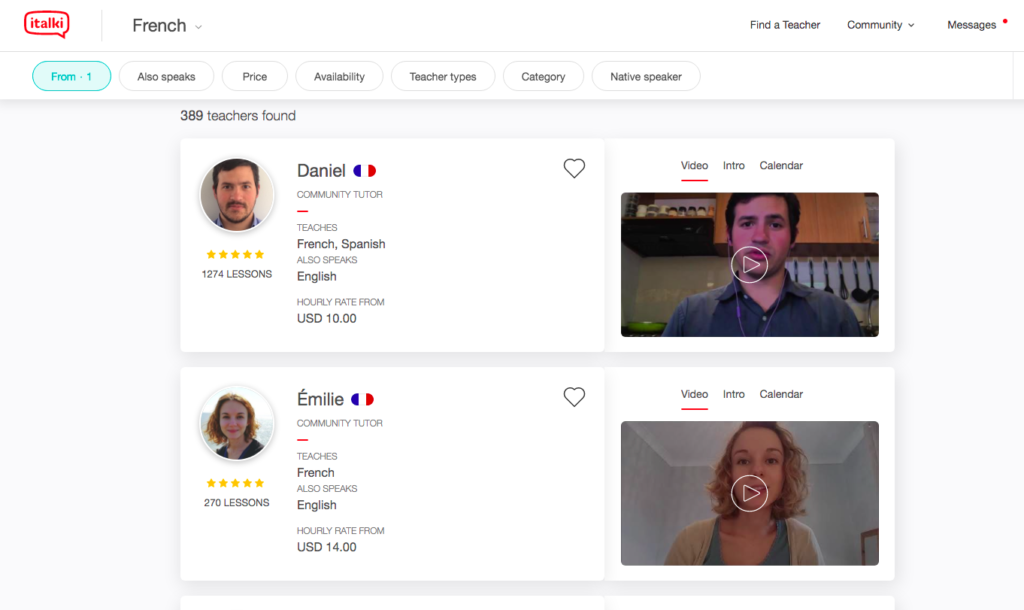
Watch each teacher’s video and see who you feel comfortable with. Who seems like a fit? Who specializes with students at your level (complete beginner vs expert)?
As soon as you have a few sentences and words down, I highly recommend you chat with a native speaker as soon as possible, even if it’s just a brief online class.
If you don’t still feel comfortable speaking, no problem! You can also try HelloTalk, an app where you can chat with regular people by texting (which is often less stressful) and have them help you in real-time so you can get feedback in a more relaxing and comfortable setting. That way you can remove the fear and focus on interacting with native speakers.
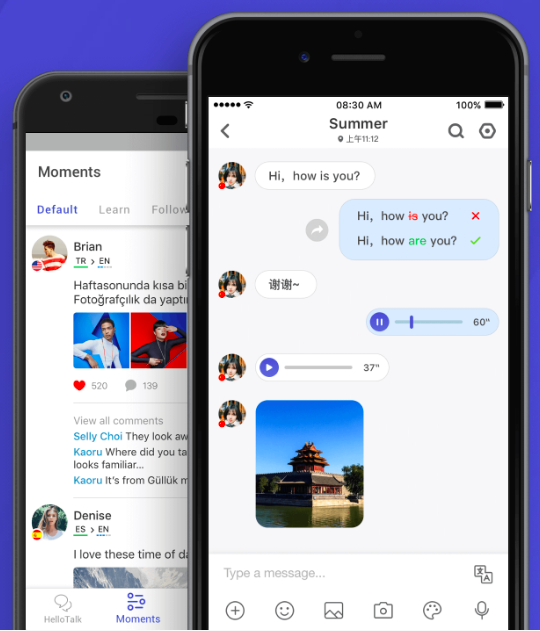
There’s something for every level.
Here’s another tip: If you’re at a language meetup or class with other students, always talk with people at a HIGHER level and who are as motivated as you (or more).
Talking to more advanced people will help boost your skills rapidly. And if they have a strong motivation, they’ll help push you along in your own journey.
If you want to learn as fast as possible, always surround yourself with the right people.
9. Learn the foundations with the right resources
Have you heard about the 80/20 Rule?
This refers to how roughly 80% of results come from 20% of actions. So, with languages, this refers to how 20% of words are used 80% of the time (or more), 20% of verbs are used 80% of the time, etc.

To use this rule to learn a foreign language faster, focus your efforts on the 20% — the most common vocabulary words, the most common verbs, most common adjectives, etc. — to get the most impact from the effort and time you put in.
Find the biggest bang-for-your-buck and focus there.
For example, with French, I spent a disproportional amount of time learning the present tense because it affects other tenses. (If I didn’t learn it, everything else would be hard.)
To learn that 20%, however, you need to take the time to memorize it. In French, one of the hardest parts (of its many hard parts) is the conjugation of verbs and memorizing ALL of them. I simply couldn’t skip that step; if I wanted to do it, I had to spend that time.
Fortunately, there’s a lot of resources to help you learn foundational elements.
I took a page from Scott Young, author of Ultralearning, who’s done several incredible learning challenges like “The MIT Challenge,” where he learned MIT’s 4-year computer science curriculum in a single year (only with self-study), and the very relevant “Year Without English,” where he went to four foreign countries and learned four different languages in, again, just ONE year!
Clearly, he knows his stuff — and knows how to learn well — so I’m going to link directly to what he advises:
Here’s my picks for best resources, in order of priority:
– Scott young
1. Pimsleur. An older technology, and sometimes a little expensive. However, the thing it does right is that it forces you to recall and pronounce whole phrases from memory. This is exactly the training you need to give yourself that beginner foundation. Just don’t expect it to get you to fluency.
2. Teach Yourself. These offer a decent overview of the language. Practice is often less automatic with these, but they do provide enough information to start having basic conversations where the real work can begin.
3. Flashcards. A final strategy is to just use flashcards, from an app such as Memrise or Anki. There’s too many resources to mention here, but the main advantage they have over DuoLingo is that you must produce the whole answer in your head, rather than select them as multiple-choice or from a word bank.
Putting it all together (my personal story)
Ultimately, I went to the extreme and moved to France to join a full-time intensive program because I wanted to go all in. (And because I’m crazy.)
But there was just one little problem:
BEFORE I COULD EVEN TAKE THE COURSE, I HAD TO QUALIFY FOR IT. (Full intensive and immersion programs generally do not accept complete beginners.)
And where I was at the time, I definitely could NOT. So I had to force-feed myself French just to get accepted into a program… that would force-feed me even more French!
Yet I STILL was able to use these tips to accelerate my learning.
Ultimately, I went from the least qualified person in my class (and with the smallest background in French) to learning faster than the rest — while being the only student working full-time simultaneously.
Here’s how I used these tips in my own journey:
First, I started by reading French sports news and read it aloud every day for 15 minutes. In fact, I forced myself to make it my only source of sports news, which then forced me to open Google translate at the same time to figure out just what the heck they were saying.
I sounded terrible: I spoke so slowly, my accent was awful, and I felt so bizarre. At the end of the 15 minutes, I felt like stretching my mouth!

But I stayed consistent and got better very quickly.
Then, I went to Italki and booked a few online classes with tutors for 60 minutes, even though I could barely speak. I just kept talking in whatever French I knew and, thankfully, they helped me through it.
Then I booked my language classes in France.
Once I arrived, I was a man on a mission. Because I was behind others in my class, I was always first to volunteer to read aloud and get real-time feedback. At school, I kept talking to people more advanced even though I felt, at first, they didn’t want to talk with me because my French was poor.
But my effort soon paid off.
Despite balancing my full-time freelance work (with MANY pressing deadlines and big timezone differences), I started improving quickly and dramatically. In fact, I reached a point where I didn’t feel challenged enough and had to make a hard decision:
I emailed the school director requesting to skip a level.
The new class was, in reality, a bit too advanced for me at the time. But I adapted, learned on my own, and finally fit in just fine.
Meanwhile, I noticed other students, however, sometimes had poor mindsets and were frustrated by the language or by being wrong — they kept beating themselves up, making it harder for them to learn. (I also noticed there were two types of students: One who spoke in their native language outside of class and those who tried to speak French.)

Outside of school, I forced myself to make conversation with locals daily. (Which isn’t the easiest thing in France.) But I tried, and even though there were moments where I felt embarrassed, it helped me grow and introduced me to some new friends!
I used the Bruce Lee hack by talking to myself in French at home, forcing me to constantly use what I learned and get more comfortable. (I did it so much, there were times I ALMOST spoke French during phone calls with American clients.)
In just seven weeks, I was able to go from barely being able to string together some sentences to having conversations with locals that lasted hours.
I used all of these tips to hack my language study and learn French much faster while balancing full-time freelancing in a different continent. I arrived at my school the least qualified…
… and I left at the top of my level.
(I even used a lot of these tips to rapidly learn Chinese 10 years ago too! I went from entering a class 3 MONTHS BEHIND EVERYONE ELSE to setting the curve on all the exams.)
I hope these tactics inspire and encourage you on your journey, and I hope they help you master the foreign language you want. Best of luck!

[…] the time you finish this, you WILL change your thinking and learn more in one article than you’ll learn searching the web for thousands of workouts or […]